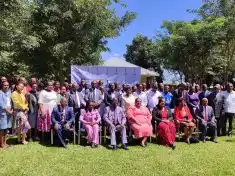
The Forum for African Women Educationalists in Malawi (FAWEMA) says it will directly support 1350 marginalized young women and men to attain quality higher education in both technical colleges and public universities across the country.
FAWEMA’s Board chairperson, Maggie Madimbo, disclosed this yesterday in Mponela, Dowa, where the local NGO partnered with the National Council for Higher Education (NCHE) to disseminate standardized bridging programme guidelines.
Madimbo said FAWEMA is implementing a seven-year Mastercard Foundation-funded project which has a bursary programme targeting marginalized young women and men which will also Indirectly impact 134, 000 individuals
The new project is known as Second Chance Pathways for Increased Access to Tertiary Education for Marginalized Young Women and Men and is already in its second year, with a first cohort being supported.
“The program places a significant emphasis on science, technology, engineering and vocational training (TEVET), and is aligned with Malawi’s 2063 human capital development pillar,” she explained.
She added that the project aims to give a chance to underprivileged young women and men, especially from rural areas, who are academically able but are disadvantaged and unable to make it to the universities or technical colleges.
“The project has two key focus areas, namely: skills development, which supports 600 young people from marginalized communities to gain marketable skills and innovative abilities by working with the Ministry of Labour and technical colleges. The other pillar is the bridging program which will help 750 marginalized young people to enter tertiary education through partnerships with public and private universities,” said Madimbo.
Commenting on the bridging guidelines which were being disseminated with financial support from Mastercard Foundation, NCHE Chief Executive Officer Ambumulire Phiri said, the council developed the guidelines in 2023 in response to inconsistencies, irregularities, and quality gaps experienced in the design, governance, and implementation of bridging programmes among higher education institutions (HEls) in the country.
“We believe that these guidelines will help bring consistency in the sector and we thank FAWEMA for supporting us to have these guidelines disseminated through this workshop,” she said
Among other things, the guidelines include a minimum requirement for university enrollment into the bridging program and duration.
Deputy Director of Higher Education Valentino Zimpita commended NCHE for being diligent, saying where there are no guidelines, there is chaos and quality is compromised.






0 Comments